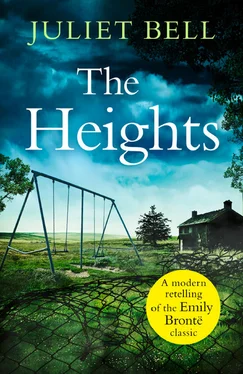Lockwood could see the priest didn’t recognise him. And why should he? Most of the time they had faced each other, a riot helmet and shield had obscured Lockwood’s identity.
‘Were you looking for someone?’ The suspicion was evident in the priest’s face. The two words Lockwood had spoken would have been enough to show him for what he was. A stranger. An interloper. And from the south. Even now, distrust of southerners ran deep among the people who had lived through the strike.
‘The boy who died just before Christmas. Luke Earnshaw.’
‘What about him?’
‘I wanted to visit his grave.’
Father Joseph wanted to say no. Lockwood could see it in his eyes. But his curiosity was stronger than his distrust. Instead, he grunted and started walking down the hillside towards a remote and overgrown section of the graveyard.
As they walked along a narrow and barely visible path, the graves became increasingly neglected. Brambles grew wild, their long tendrils sharp with thorns, covering the carved stones. In places, the deep-red berries stood out in sharp relief, blood-red against pale stone. Lockwood’s trousers and feet grew cold and wet as he pushed his way through the long grass, following the stiff-backed priest. They were approaching an ancient section of the graveyard, near the stone wall that separated hallowed ground from the wilderness of the moors. In the distance, Lockwood could see the rusting gantries of the mine head. Most of those buried here lay beneath plain slabs, carved with little more than a name and a date.
‘Here he is.’
The grave still looked freshly dug. The earth was bare. It was too cold now for the grass to cover it. There was no headstone. There was nothing to remind the world of the boy who lay there.
‘Why’s he right back here?’
The priest stared at the ground. ‘Most families prefer plots nearer the path. This one’s folks didn’t really care.’
Lockwood stared at the plain carved stone. ‘Luke Earnshaw.’ He whispered the words into the breeze.
‘Yes. May God grant him mercy.’
The underlying emotion in the priest’s voice surprised Lockwood. ‘You knew him?’
‘No. No one did. He was barely seen in the town after his father brought him home.’
‘His father…’
Heathcliff Earnshaw.’
That was the opening Lockwood had been waiting for. And the contempt dripping from the priest’s voice left him in no doubt that it would lead him somewhere he wanted to go.
‘The Earnshaws were a mining family, weren’t they?’
‘They were,’ the priest said. ‘There’s many around here were that, before the pit closed. But Heathcliff wasn’t from around here.’
‘No?’ Lockwood feigned surprise.
‘No. The old man brought him here as a brat. All wild and wilful. A gypsy brat, some said. The bastard of some Irish tart. There were them that said he was Earnshaw’s kid.’
‘And was he?’
‘That’s something only the good Lord knows. I’m sure he regretted bringing him here, whatever the reason.’
‘Why is that?’
‘The boy had an evil heart. Even then. Tore that family apart. Running wild with the girl. Fighting with the son. Sinful. And Ray Earnshaw never lifted a hand against him.’
‘What about his wife?’
‘She was no better than she should be either.’ Father Joseph passed judgement. ‘She wanted no truck with Heathcliff. Or the others for that matter. Social services were always up there at the Heights. Finally, she up and left with some fancy man. A travelling salesman or some such. That’s when the rumours started about Mick. The son.’
‘Rumours?’
‘That he wasn’t really Earnshaw’s son. That she had been sinning too.’
Lockwood hid his surprise.
‘And was he… Earnshaw’s son?’
‘Only the good Lord knows.’ Father Joseph wasn’t going to let a question distract him from his story. He nodded towards another grave. This one was much older. The brambles had almost covered the tall cross, and the name written on it was obscured.
‘The old man went to his grave never saying nothing,’ the priest said. ‘Died on the pickets, he did. Police thugs. Maggie did for him same as she did for the pit and for the whole town. I hope she rots in hell for what she did.’
Lockwood shivered but didn’t reply.
Without another word, Father Joseph turned away from the grave and set off back up the hill towards his church. Lockwood followed, watching the sodden hem of the priest’s cassock flap around his ankles like the leathery wings of a bat.
By the time Lockwood got to his car, the rain was falling in earnest. He started the engine and turned the heating up to high. While he waited for the engine to warm up, he rubbed his icy fingers together and stared out over the graveyard to where Luke Earnshaw lay in his unmarked grave. In the rain, the graveyard looked even more bleak than before, if that was possible. Old Mr Earnshaw. Mick. Luke. There had been other graves, too, in that little group by the wall. He wondered if they were also Earnshaws. He would take a look – but not right now. He needed to get warm and dry, and he needed something to eat. He decided to try the pub at the top of the town. It looked the sort to have a fire in the bar. After the chill of the graveyard and the man who cared for it, a cheerful fire would be welcome. He slipped the car into gear.
He drove up the hill and on an impulse turned left towards the Anglican Church. He pulled up opposite the large, well-kept building. It was a far more modern construction than the Catholic church, no doubt built at the height of the mine’s prosperity. The plaster walls were painted a rich cream and the doors were a dark mahogany colour. Even through the rain, he could see the rich colours of the stained-glass windows.
The church itself was set close to the road. Here, in the middle of town, there was no vast overgrown graveyard. Instead, elegant marble tombs had been built in a paved area beside the church. Tombs for the wealthy people of the town. The mine managers and owners who had never been forced below ground to feed their families. The Lintons, he knew, were buried here. Their graves were marked by simple, classy, marble slabs.
Cathy was here with them, buried as a Linton, not an Earnshaw. Would she have liked that? Had it been warmer, Lockwood might have gone to investigate. He was about to drive on when movement caught his eye. He let the car roll forward a couple of feet to get a better view.
A man was standing by one of the graves. The marker stood out from the plain grey stones around it. Here a sculpted angel with head bowed and wings spread stood sentry over the grave. The man was tall and thin, wearing a black coat, the collar turned up against the weather. Lockwood didn’t need to see his face. He knew in an instant who it was. Heathcliff. The kid with the nail gun. The very first one who’d ever got away. He was staring at the marble slab on the ground in front of him, as if he could see through it to the woman who lay beneath. How long had he been there, Lockwood wondered. And how often had he come here to stand like that and mourn the love he lost so long ago?
When Heathcliff moved, it was with violence. He slammed his forehead against the angel’s face, not with the gentle touch of sadness but with the savagery of unbearable agony. Again and again Heathcliff smashed his head against the stone. He dropped to his knees and pounded on the marble slab with his fists, and then scraped and dragged at the ground with his bare hands.
When at last he stopped and slowly stood up, his shoulders heaved. A line of blood ran from his hairline down his brow.
Lockwood watched as Heathcliff walked through the church’s wrought-iron gates and turned down the street. He was hurrying now. Once he lifted his head and looked upwards towards the blue hills and the moors beyond. Lockwood’s eyes followed his gaze. There was nothing there, nobody calling to Heathcliff from the hills. There was just the graveyard, Heathcliff, and DCI Lockwood looking on.
Читать дальше












